
إنَّ بلدًا تقفُ الحربُ الأهليّةُ خلفَ بابِه ليس بلدًا قابلَ الحياة. إن شعبًا يَتعرّض فيه كلُّ جيلٍ من أجيالِه لتجربةِ الدمِ حريٌّ به البحثُ عن مصيرٍ آخَر. إن مجتمعًا يسيرُ عكسَ حركةِ التقدّمِ والتاريخِ يَلفِظُه الحاضرُ والمستقبل. إنَّ نظامًا مركزيًّا يَفرِزُ الفتنَ دوريًّا ليس نظامًا مناسبًا. إنَّ دولةً لا تَحمي شعبَها هي دولةٌ فاشلة. إنَّ تعدُّديّةً تَفتقِر إلى الحضارةِ المتوازيةِ وثقافةِ السلام هي مصدرُ اقتتالٍ موسِميّ. إنَّ مكوّناتٍ لا يتضامنُ بعضُها مع البعضِ الآخَر لا تحترمُ بديهيّاتِ الشعورِ مع الشريكِ الآخر.
أحداثُ 14 تشرين الأوّل وخِطابُ السيد حسن نصرالله وما تَبِعهُما من مواقفَ ملتَبسةٍ ومتقلِّبةٍ وذِميّة، أيْقظَت هذه المعطياتِ القديمةَ/الجديدة، وأكّدَت، مرّةً أخرى، استحالةَ البقاءِ في ظلِّ دولةٍ مركزيّة. ما تَصوّرتُ يومًا أن يُهدِّدَ السيّدُ نصرالله المسيحيّين اللبنانيّين بذاتِ المنطقِ العَدائيِّ الذي يُهدِّدُ به إسرائيل. يَتوعَّدُ إسرائيلَ بمئةِ ألفِ صاروخٍ، والمسيحيّين بمئةِ ألفِ مقاتل. إشكاليّةٌ هي توحيدُ الأرضِ والشعبُ منقسِمٌ، ومأساةٌ هي تقسيمُ الأرضِ الوطنيّةِ بسببِ انقسامِ الشعبِ لدَواعٍ غيرِ وطنيّة. عِوضَ أن يكونَ التقدّمُ في الزمنِ تَقدُّمًا في تثبيتِ دولةِ لبنان، أخَّرَها. وعِوضَ أن تكونَ المحنُ عِبرةً تَختِمُ حروبَنا بالشمعِ الأحمرِ، بَقيت مفتوحةً وتَفنَّنا في إعادةِ إنتاجِها. غريبٌ هذا الوطنُ الذي نَشأ للكلمةِ ولا يَحتكِمُ إلا للسلاح، وتأسَّسَ للتوافقِ فصارَ بئرَ أحقاد. نحتاجُ هيئةً لمكافحةِ الأحقادِ أكثرَ من هيئةٍ لمكافحةِ الفساد.










